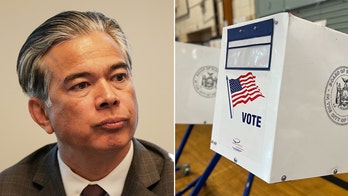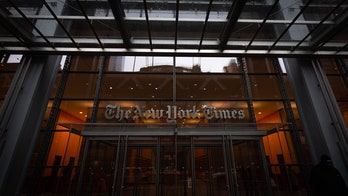WASHINGTON - President Obama told labor leaders in a tense two-hour closed door tussle over whether to tax health care benefits that he backed the tax, which labor leaders vehemently oppose, but also supports efforts "to protect working men and women."
Their problem? Labor leaders say you can't have it both ways. Some now openly accuse Obama of doing that and violating one of his most important early promises in the health care debate: that if you like the coverage you have, you will be able to keep it.
Obama did not attend all of the meeting held in the Roosevelt Room, but, according to an official who spoke on the condition of anonymity "reiterated his support for the excise tax but also reiterated his commitment to protect working men and women."
Obama's top health care adviser, Nancy-Ann DeParle led the meeting in the president's absence, the White House said.
The "excise tax" refers to the Senate attempt to slap a 40 percent levy health insurance benefit plans valued at $8,500 for individuals and $23,000 for families (for high-risk occupations like law enforcement and firefighting the levels are $9,850 and $26,000).
Some have dubbed these plans "Cadillac" coverage because of their generous array of benefits. Labor leaders say the better moniker is "Chevy" because, they say, the tax would also hit union and non-union families. The tax applies to the accumulated value of standard health insurance, secondary plans that cover dental and vision expenses and flexible spending accounts.
But labor leaders, led today publicly by AFL-CIO President Richard Trumka, call the Senate tax an assault on middle-class familes and a sop to American "elites." Trumka and other union leaders favor the House-passed 5.4 percent surtax on individuals making more than $500,000 and couples who earn more than $1 million.
"The senate bill instead drives a wedge between the middle class and the poor," Trumka said in a speech at the National Press Club just hours before the White House showdown. " The senate bill taxes the middle class by taxing workers health plans. The Senate bill pits working Americans who need health care for their families against working Americans trying to keep health care for their families. Now this is a policy designed to benefit elites."
Significantly, Trumka did not threaten to torpedo health care reform if the Senate excise tax survives intense negotiations with House Democrats over a final bill.
"The Senate bill from our point of view is inadequate," Trumka said. "It does not deserve the support of working men and women. We are a long ways from the finish line yet and we're going to try and get a bill that does, should and and will garner the support of working people in this country. Bringing health care to every citizen out there is too important for us to get this close and say we quit."
No one else in the labor movement is publicly advocating killing the entire bill over the issue, but concern is growing over the excise tax. One union leader today flatly rejected it and accused Obama of breaking his promise to shield working families from taxes and cuts in health care benefits.
"In 2008, then-candidate Obama promised three things: he said he would not raise taxes on folks making less than $250,000 a year; he vowed not to tax health insurance benefits; and he promised that under his health reform plan, people would be able to keep their existing coverage," said Harold Schaitberger, president of the International Association of Fire Fighters. "Now, President Obama supports the misguided excise tax passed by the Senate.
The Senate bill will either subject the health care coverage provided to thousands of America's fire fighters to a tax or those benefits will be slashed to avoid the tax."
Schaitberger said the IAFF will oppose any excise tax on health benefits. A smaller member of the AFL-CIO, Schaitberger's union was not invited to the White House.
These unions attended: AFL-CIO, Change to Win, National Education Association, United Steelworkers, United Food and Commercial Workers, International Brotherhood of Electrical Workers, Teamsters, American Federation of Teachers, Service Employee International Union, Laborers International Union, American Federation of State, County, and Municipal Employees, Communication Workers of America. The United Auto Workers were invited but did not attend.
Union sources said several blue collar unions - among them the Steelworkers and Electrical workers - fret a rank-and-file backlash in the 2010 mid-term elections if the health benefits tax passes.
Schaitberger was more blunt.
"It's a disaster, a nightmare," Schaitberger said of the excise tax. "Our membership will see it as a betrayal."
The fight over taxing health benefits is unlikely to derail Obama's full-court press for health care reform. But it has punctured the aura of inevitability the White House has assiduously sought to build around closed-door House and Senate negotiations.
Sen. Chris Dodd, Connecticut Democrat and key player in health care, told CNBC today that the reform effort was "hanging by a thread."
Rep. Joe Courtney, Connecticut Democrat, told Fox News that anger over the Senate excise tax dominated a members-only conference call organized by the House Democratic leadership on Thursday.
"There was no question that the excise tax was the number one issue," Courtney said. "It surpassed abortion. It surpassed the purchasing exchanges in terms of the concerns that members have."
Courtney has collected signatures from 190 of 256 House Democrats opposing the Senate health benefits tax. He agreed with Dodd's characterization of the shaky state of health care talks.
"This process is very precarious right now," Courtney said. "Both chambers really have to approach it in a positive way, but understanding that there's real challenges that need to be fixed here. No one is trying to walk into it with positions that are just designed to blow the whole process up. But nonetheless, the Senate position is, I think, very problematic."
Courtney predicted significant political peril for Obama and rank-and-file Democrats if the excise tax survives largely in tact and benefit plans either shrink in size or premiums increase to compensate for the higher taxes assessed on insurers.
"People out there who, again, are not members of unions but have a primary plan and then have secondary coverage, they will be very unpleasantly surprised to realize that all of those premiums will be aggregated and subjected to the tax," Courtney said. "They'll either drop coverages or they'll just take the hit, in terms of absorbing the tax and paying it, which, again, at a 40 percent rate is very steep. It's really about sorta changing choices that people presently have today because of the tax status that health benefits presently enjoy."
Companies and governments deduct the cost of health benefits from their taxes. Blue collar union leaders say their membership has in recent years traded wages for more generous health benefits. Public employee unions haven't experienced this type of trade-off, but their leaders fear cash-strapped states, counties and cities will cut back of benefit packages to avoid the excise tax.
Courtney says the biggest problem for Obama could be a sense that he betrayed his oft-stated promise to hold existing health plans harmless.
"Let me be exactly clear about what health care reform means to you," Obama said July 16 in Holmdel, N.J. "First of all, if you've got health insurance, you like your doctors, you like your plan, you can keep your doctor, you can keep your plan. Nobody is talking about taking that away from you."
Courtney said the excise tax will materially change coverage for millions of middle class workers. That, he warned, could invite a nasty political backlash.
"That is a central promise to Americans who have health insurance today and that is really where the battle for public opinion over health care reform really lies," Courtney said. "If large numbers of people feel that this effort is about taking away a benefit that they presently have, then support for it really begins to decline very rapidly."




